|
Just days after the commemoration of the assassination of Dr. Martin Luther King Jr., I arrived in Memphis, TN. I'd been invited to perform my one man show, We Are Here, at the National Black Box Performing Arts Festival, convened by Hattiloo Theatre. The journey had been long and tedious. While the trip from Los Angeles should have been a matter of a few hours, I ended up on a twelve our journey, most of which was spent in an airport in Minneapolis. I arrived exhausted and anxious about how I was going to get through my tech and first performance. I grabbed a few hours sleep and headed towards the performance venue. I'd been told that it was in walking distance, but I was nervous about getting lost and showing up late. So, I ordered a Lyft and off I went.
As we traversed Memphis I was struck by the signs of development that I'd witnessed in every major city I've visited over the past ten years. I hesitated to name it gentrification as my knowledge of Memphis was extremely limited. I passed streets whose buildings seemed to have been carefully preserved to evoke memories of soda jerks and water cannons. I passed the mouth of Beale street and thought of James Baldwin. I approached a sign that said Lorraine Motel and my breath caught. Another that said National Civil Rights Museum. The rambling of the Lyft driver about some decadent dessert she'd had faded to a dull hum. A brief news clip flashed through my mind of politicians, civil right stalwarts and the surviving King children. The car stopped and I slowly eased myself out of the car. Standing seemed difficult. I mumbled a thank you, closed the car door and just stood there trying to settle the galloping of my heart. A beat later I began to move. My mind slow as molasses grappling with where I was and what I was called to this place to do. I rounded the corner and there was a plaza laid out before me, the entrance to the museum straight ahead, while to my right stretching the length of the plaza was the Lorraine Motel. What color its walls were I could not say, as all I can remember is the red wreath hanging from the second floor balcony marking the spot where Dr. King was shot. “I am on hallowed ground, I am performing on hallowed ground”. I made my way slowly towards the entrance feeling reverence, deep sadness, a bottomless loss and anger. A rage at what could have been: King, Malcolm, Medgar and the countless leaders gone too soon. I moved forward angling towards a raised granite slab positioned just opposite that blood red wreath, I read the inscription, placed my hand upon it and prayed. I prayed a prayer of thanksgiving for being alive and free in this moment, I gave thanks for those who gave their lives for my freedom, I gave thanks for every ancestor who made a way for me, I gave thanks for the honor and privileged to be an artist, I asked for strength to tell the stories I was here to tell, I prayed for the capacity to hold space for all the lives that would be shared with me and I prayed for the wisdom to plant seeds of healing for our communities. As I finished I turned and saw an older brother watching me with a slight smile on his face. We acknowledged each other with a slight tip of our heads in the special way that black men do. I then walked inside the museum...ready. Any anxiety I’d had about not having been in the performance space before, meeting the production folks for the first time or lingering exhaustion melted away. I was met by stage manager, James Cook and we jumped into the fastest tech I’d ever experienced. The show was a blur of focused intensity with me just holding on for dear life. The intimacy of a one-person show always leaves me surprised and slightly overwhelmed. It's like standing naked in a crowded room. It's an invitation to others to examine your most vulnerable places. It’s also a very powerful place if you can compel the hearts behind the eyes to see you fully and climb aboard for the ride. There are indications that you sometimes see and feel when the audience is with you. There’s a quality to the silence, nuanced physicality, cosigning side effects and laughter in the right and wrong places. This audience was with me, They’d accepted the invitation. As the show ended and as the lights came up, I made my way back to the stage to start the second act of the performance...the talkback. I was fortunate to have the support of Daniel Banks, a dear friend and colleague who’d agreed to assist me in facilitating the post show conversation. Daniel, who runs an amazing organisation called DNA Works, just happened to be attending the festival. I was looking forward to a workshop on hip hop theatre that he would be facilitating for college students the following day. He helped us transition out of the show and bound us together with breath and focused intention, where the real work begins. The hour that I spend alone on stage is just a warm up to get us to a place where as a community we can have the hard conversations about how to stop Gender Based Violence. For three days, I performed this show and held these conversations. Each night, people opened themselves to each other, spoke about moments in the show that touched them, and made them reflect on their own personal experiences with violence. They spoke of secrets seldom shared and the shame, anger, and confusion associated with those memories. There were men who spoke of how difficult it was to talk about what the play reveals, because it's just to painful. Women spoke of how heartbreaking and informative to witness one male character grappling with the rape of his daughter. A man spoke about his lifelong fear of raising his son and getting it wrong because he hadn't had a father to teach him how to grow into a man. There were people who spoke about how damaging family secrets can be. They spoke of the responsibility of the community and the disconnect between young and old. They shared stories of personal trauma and sexual violence visited on their own bodies. As always in these conversations, the voice of women was the most vocal and the frequency and severest violence was most often visited upon their bodies. We talked about solutions, actions we could all take in our spheres of knowing. In the midst of it all I was struck by how hungry people were to have this conversation. Memphis, unfortunately like so many other places across the globe is suffering an epidemic of violence that leaves nobody untouched, whether it's out in the open or skulking in the shadows. With this festival Hattiloo Theatre and its partners had created a unique space in modern black theatre that allowed art as activism to be at the forefront of theatre-making. It felt like a continuum in the legacy of the Black Arts Movement. In addition to the performances, they also programmed a one-day HBCU Theatre Conference for undergraduate students enrolled in regional HBCUs. The conference included intergenerational panels with legends in American Theatre, skills development and knowledge sharing workshops, tours, film screenings, and networking opportunities. All three of my performances took place in the auditorium of the National Civil Rights Museum and everyday I gave thanks. The staff at the museum and those at Hattiloo Theatre created a warm and welcoming environment that permeated my entire visit to Memphis. The city was just as embracing as I found out when I stumbled into Deja Vu (thanks to Daniel Banks and Alexis Miles), a gem of Louisiana Creole cuisine in downtown Memphis. The hostess greeted us with the warm familiarity of a cousin. We settled in to peruse the menus while reflecting on the night's performance. I had my mouth fixed for a number of creole vegetarian options, but was left wanting. I called over our waitress with a complaint on my lips while she wore a ready smile on hers. I immediately turned discord to charm and she answered with an easy wit as she offered to call over the Chef Gary. A few minutes later he was at our table and my new best friend, a native of New Orleans with a big heart and red beans and rice that would make your momma weep. It also turns out we were both alumni of Southern University (Baton Rouge). We laughed, took photos and reminisced about days on the “Yard”. We talked about “The Human Jukebox” (our school's marching band), the sense of community and the beautiful solitude of standing on the bluff overlooking the Mississippi as the sunset. That night I slept well, belly full, spirit charged, and mind full of the synchronicity of life. _________________ Written sitting by the Mississippi River in Memphis, TN I walked along the Mississippi this morning and wondered about Langston's rivers. I heard the bubbling cacophony of Beale Street at the back of my mind. I wondered at the rivers of people that have sailed up and down the Mississippi. Flowing through the streets of Memphis depositing life and flavor in every inch of these cobblestone streets. These streets are alive and I feel them in me. The river pulls at me, yanks me out of my bed and steers me down Monroe Street until I feel the breeze like a hand maiden pushing me ever forward. I feel Langston's rivers flowing through my body. How many generations are packed into these veins? And there she sits wide and deep. Dark brown waters so different from the clear warm currents of the Atlantic. Chocolate baby grown strong on beaches of South Florida. Those waters pulled at me in a more ethereal sense like God running his/her hand along the side of my face. The Mississippi speaks like spirits trying to be understood, like omens of what's to come. That is the nature of the south histories locked into soil, bodies and rivers. Here upon these banks at this bend, the new tries to settle into memory. The fit is precarious. We teeter on the edge until the bones are cast, blood is paid and the waters say all is ok. All is ok.
0 Comments
This post is dedicated to all those on the front lines of the #FEESMUSTFALL protest in South Africa. In particular in memory of Benjamin Phehla, a student at TUT (former chairperson of the Faculty Student Council of the information and communications technology department). He was killed today as a car crashed into a group of protestors. I see you young ones... Transforming the sacred halls of knowledge. I see you plotting, sharing and coding under jacarandas, in student accommodations, on street corners and on social media. All amidst the crushing weight of debt. Sandwiched between walls of bodies unable to sit at the table and the noise of corruption. You carrying the communities hope. Set aside your burden for a moment. You have set your eye on a more pressing mission. You've exchanged the weapons of the "learned" for the tools of the liberator You are the blended fruit suckled on songs of liberation. Draw upon the struggle in your blood and the bodies at your feet. Biko, Ngugi and Nkrumah have planted their seeds well. Electronic glows illuminate faces, eyes focused, spirit enraged, your very being determined. As you watch and stream and text your woes and comrades into rushing streams of action.
They never knew what hit them. Those ones that heralded the first breath of freedom and then let it rot under hazardous care. They slept as you toppled statues They bried and feted as you burnt paintings, the first offering. They snickered thinking that you were focused on the past while ignoring the present. That you were consumed by shiny things and the Kardashians. They thought you were just sipping lattes at Vida end eyeing Krispy Kreme. Even now they stew in their own juices not realizing you are in it for the long game. Flames are rising and the fuel of indifference sparks an inferno. 13 bullets sealed your fate! Don't act like you don't know what happens when you strike a rock. She won't crumble. She will rise and build again. That's a promise! They saw what you did to khwezi and vowed not to be raped and silenced anymore. After first blood was drawn and rubber bullets dented flesh and tear gas left stinging eyes and seared lungs...fear fled. Who cages their young when they cry out in pain? And now a life is lost. A warrior dead! No, a boy easing into manhood. Can you count his potential offspring cut short by your nonchalance? The ancestors can and they seethe for vengeance. Students seeking a future, access, opportunity and unfulfilled promises. These are no warriors. This is no war. These streets are not battlefields This is no foreign land You are no occupying force You are not protecting us from harm! My tears sit beside my rage. Comforted only by hope well placed in these young ones. Standing in the middle of the road. Does it look familiar. Once upon a time you were they. These young ones pushing a tide of change. I who stand on the sidelines am placing one foot in the road and then another. I stand side by side, in front and behind, because you are my hope and I will protect it all cost. Without hope all is lost. Whether it's in the streets of South Africa or flowing from the lips of Michelle Obama. Hope is the recognition of what is important right now It is the promise of what is to come. Yes young ones I see you.
Let's Talk about Sex Ladies (Gentlemen Welcome): An Evening of Erotic Storytelling
BUY NOW | Let's Talk about Sex Ladies: An Evening of Erotic Storytelling Featuring Renowned Author Tracy Kadungure: THE TANAKA CHRONICLES | Moderated by Palesa Letlaka | Actors: Adetoro Makinde & Leslie Jones | Discussion Contribtor: Dr.Dorothy Nairne Produced by Antonio Lyons Tickets: $10, includes: Complimentary wine and snacks 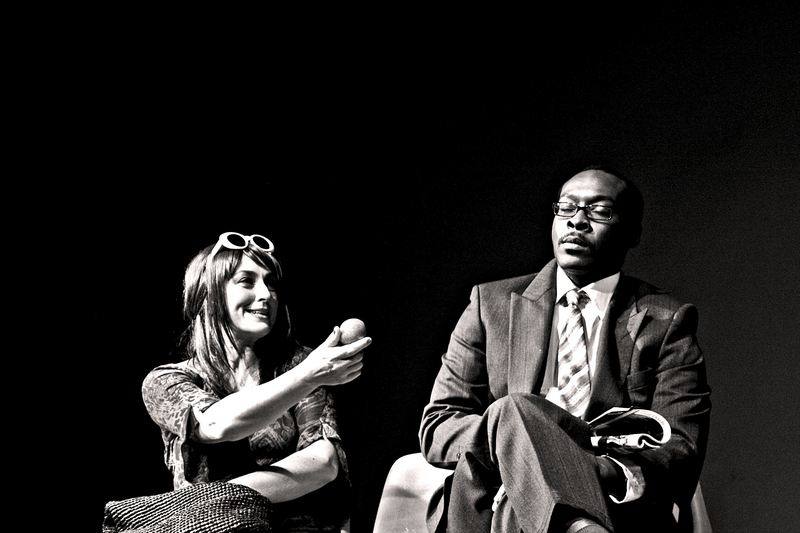 Dutchman at the Market Theatre. Directed by Lindiwe Matshikiza. Actors: Antonio David Lyons and Camilla Lilly Waldman. Photo by Nhlanhla. Dutchman at the Market Theatre. Directed by Lindiwe Matshikiza. Actors: Antonio David Lyons and Camilla Lilly Waldman. Photo by Nhlanhla. This week on HowlRound, we cast our gaze across oceans towards the world of South African theatre. A nation characterized by its Apartheid legacy and struggle for liberation, we hear the story of a nation reborn and the art at its center through the voices of some of its most dynamic artists. Find the full series here. When I was asked by the folks at HowlRound if I would be interested in curating a week on South African theatre, my brain said, “Really?” while my mouth said, “Yes!” After I hung up the phone, I pondered two fundamental questions: Why did they ask me? Who am I to talk about South African theatre? The first question was a bit easier to get my head around. I'm a theatre practitioner and I’ve lived in South Africa full time since 2003. More and more when I think of home, or when asked where home is, Johannesburg is at the forefront of my mind. It rolls off my tongue as easily as the actual location of my birth. The second question is one I'm still grappling with, but as I reflected on my personal and creative journey in South Africa, my questioned switched to, “Why not me?” I'd never seen such meaningful and intentional theatre before moving to South Africa. It has been even more gratifying becoming part of this daunting and bewitching community. In the twelve years I've been in South Africa, I've become part of the fabric of a vibrant artistic community that stretches from the stark, cool beauty of Capetown to the lush, rolling hills of Kwa Zulu Natal and everywhere in between. I've had the pleasure of working in mainstream spaces and township community halls. Each encounter and environment has deposited something meaningful and changed me a bit at a time. South Africa has made me her own in very subtle and surprising ways. The claiming was so gradual that I hadn't realized it had happened until, on a stroll along 4th Avenue in Parkhurst, a suburb of Johannesburg, I ran into an actor friend. He was seated at a little table at Mugg and Bean, a favorite breakfast spot. We greeted each other warmly and he introduced me to his companion with, “This is Antonio Lyons, one of our finest actors.” Just like that, the Gift of Belonging was bestowed. I was surprised and grateful. I moved to South Africa a broken man; a disillusioned actor in search of peace and the creative drive that had sustained me for decades. In South Africa, theatre is everywhere. Everyday interactions are a performance that incorporates complex language structures filled with wisdom, metaphors, and humor. It’s on street corners and mall courtyards where pantomime and dance are activated by the toss of a coin. It's in funerals and weddings where the performance of millennium old rituals commingle with contemporary culture. It's in traditional theatre spaces, road shows, and community halls. I'd never seen such meaningful and intentional theatre before moving to South Africa. It has been even more gratifying becoming part of this daunting and bewitching community. Its genesis can be found in a rich cultural tradition of African theatre practices that incorporate mechanisms for documenting everyday life as well as airing community grievances. The apartheid era in South Africa would see the birth of Protest Theatre, which served to give the people a voice where they had none and communicate important ideas of selfhood and resistance. It is an aesthetic that was filled with subterfuge as it fused traditional African theatre with western theatrical conventions. Some of the greatest collaborations of this era came out of the Market Theatre. Percy Mtwa and Mbongeni Ngema—who had also worked with Gibson Kente, touring shows created for black audiences—collaborated with Barney Simon to create Woza Albert. The play explores what would happen if Jesus dropped in on Christian apartheid South Africa. John Kani, Winston Ntshona, and Athol Fugard had unparalleled success withSizwe Banzi is Dead, in which a man takes on a dead man's official papers. Kani and Ntshona were arrested in the Transkei while performing the play. While the Market Theatre is one of the most notorious houses to create and produce work that challenged the apartheid regime, there were many more scattered across the country. Those spaces were filled with artists willing to risk their lives and use their artistry to educate and empower the people. Some of those spaces were: The Space Theatre (Cape Town),Junction Avenue Company (Johannesburg), Kessie Govender's Shah Theatre Academy (Kwa Zulu Natal), Ikhwezi Players (Grahamstown), and Rob Amato's Imitha Players(East London). I would be remiss if I didn’t also mention the thriving artistic mecca of the 1950’s Sophiatown. The opportunity to curate a week of reflections on South African theatre provides an opportunity to have a more critical conversation about what it means to be a theatre artist in Post-Apartheid South Africa. The artist contributors that I’ve invited to be a part of this discussion have built upon these rich theatrical traditions. They are poets, directors, agitators, truth seekers, singers, dancers, directors, producers, ground-breakers, and theatremakers. They have all been pivotal in shaping my experience of belonging in South Africa. These practitioners are making their own unique contribution to a country and community still defining and questioning its complex identities. Through them, we delve into the rich history of South African theatre as reflected inDitshomo, a recent documentary narrated and produced by Napo Masheane that criss-crosses the country illuminating a rich theatrical history. We see the vibrant legacy of community theatre reflected by Mxolisi Masilela and his youth driven theatre company, TX Theatre Productions. We see the rise of women administrators in Warona Seane, who deftly straddles the line between a practicing artist and the Artistic Director of South Africa’s newest gem, the state of the art Soweto Theater. We get an aerial view of an industry whose shifting dynamics is a reflection of a nation in flux from Ismail Mohammed, Festival Director of the National Arts Festival. Thank you for embarking on this journey with us. Thank you to each contributor who has bravely chosen to share a corner of his or her artistic soul with you. Thank you, South Africa, for embracing me so fully. The road continues to be an otherworldly experience, yet as familiar and comfortable as my favorite pair of socks. Hambakhale! Day 1: rehearsal. Day 2 creating new production of We Are Here with @txtheatreproductions in Tembisa. DAY 2 The rain it comes. Washing away what was. Seeding the soil and the soul for what's to come. The steady drip splash upon leaf, ground, wood and tin...a meditative hum. It lingers just at the edge of consciousness. This is the space from which we prepare to enter the sacredness of creating. #TxTheatreProductions #Tembisa I've often been struck by the aesthetic and cultural differences of Cape Town in comparison to other cities in South Africa. I've always had this love hate relationship with this sublime metropolis. I could stand for hours gazing up at Table Mountain as clouds spill over its sides. The sky seems to have its own peculiar shade of blue and the air always seems freshly swept leaving me breathing deep and sweet. The sounds of the ocean and the leisurely pace of life is alluring and frustrating if your trying to get anything done at a Joburg pace. My enchantment can last for quite sometime, but eventually I begin to miss the rhythm, culture, language and blackness of Johannesburg. I can find similarities in Cape Town, but it's such an effort and pulls too far away from the aesthetic magic that is the Mother City. Two days ago I was snatched abruptly out of my cape dream, by the jarring exclusivity of Constantia Village. I guess it was too much for system to travel from the township of Kayaletshia to the upscale white suburb of Constantia. I was struck by the juxtaposition of a well maintained gardenesque spacious community with a cramped dusty jumble of dwellings. One felt like a place to live and the other like some place to survive. Upon arriving at the Constantia Village Mall with provided a divine air conditioned reprieve from the days oppressive heat I made a bee line for Kuai. I was in need of a fresh squeezed juice with a shot of wheat grass. Yeah I'm that guy who enjoys my urban suburban amenities. As I waited for my juice and a trout something or other wrap I decided to stroll over to the health food store next door. These places are like a liquor store to a wino for the pseudo health conscious. As I strolled I realized that I was on track for a head on collision with an older white woman. What usually happens in these cases is that at the last minute both parties swerve and share a moment o f connection. Sometimes it's a little laugh, a quick closed mouth smile or the flick of a nervous eye. In this case neither one of us swerved, but stood staring at each other merely inches apart. I could see and feel her expectation of me stepping aside, which didn't happen. I'm not sure if it was a bad day or a lifetime or privileged programming, but there we stood. I of course was fully reacting to the undercurrents of racism that often permeates such places. I know it was probably a bit childish of me, but every now and then one feels the need to have ones humanity acknowledged. After a few uncomfortable moments she shifted left and I shifted right and we began to move forward. It was that moment that I think my assertion of belonging became to much for her and she called me an "idiot"and I called her an "ass". I continued to my health shop utopia and was greeted by a Rastafari goddess who soothed my tension with stories of vegan and raw food deserts. So, I've just finished my morning run. Look at me sounding like it's something I do everyday. I'm trying to get it in at least three days out of the week no matter what. There's a goal I'm working towards which I won't reveal until I've achieved it. I'm learning to manifest in silence. Sometimes when I talk about something too much the forward energy behind it disperses. Well the run is done and now I'm preparing for my 2nd workshop with TX PRODUCTIONS in Tembisa. The company is comprised of approximately 12 young men who range from 18-23. I'm excited and nervous. It's the first full on workshop I've conducted since finishing graduate school. I guess I'm also super protective about the growth of WE ARE HERE. It's like having a child that's trying to grow up. I've sacrificed and invested so much into this project/movement. During our 1st meeting with this group one of the young men asked, why I'm doing this work? Why am I doing WE ARE HERE? It took me by surprise. Of course I didn't show it! But I was thrown for a moment. No one had ever asked me that before. I told him because I have to.... If not me who. I'm passionate about helping men and boys of find whatever internal and external tools they can to shape and guide their lives. its essential work to grow stronger and healthier communities....and world. I guess I'm nervous because I want to do good. I want to create space for transformation to happen. I want to have fun. But most of all I want us to discover the gift of possibility together. There's the last born people pleaser in me. So in a little while I'll connect with my co-facilitators and WE ARE HERE Ambassadors, Abel Mokwevho and Simphiwe Makapela to embark on a magnificent journey. We journey into the unknown and share laughs, theatre, hearts and knowledge with our brothers. We will be both eager students and caring teachers, the exchange goes both ways. I'll keep you posted and thanks for indulging my angst riddled self. |
Artivist(artist +activist) uses his/her artistic talents to fight and struggle against injustice and oppression—by any medium necessary Archives
May 2017
Categories |








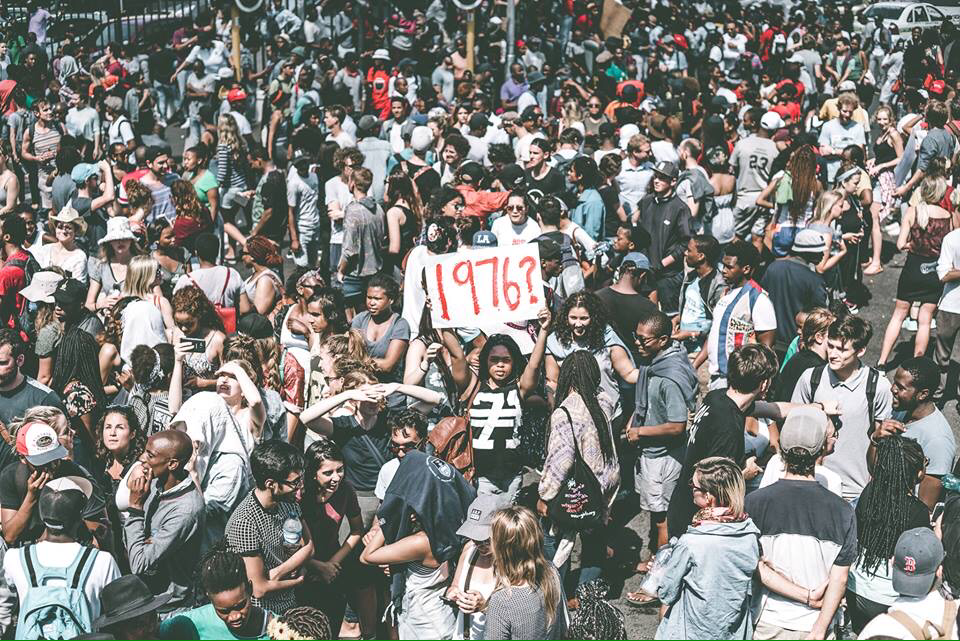
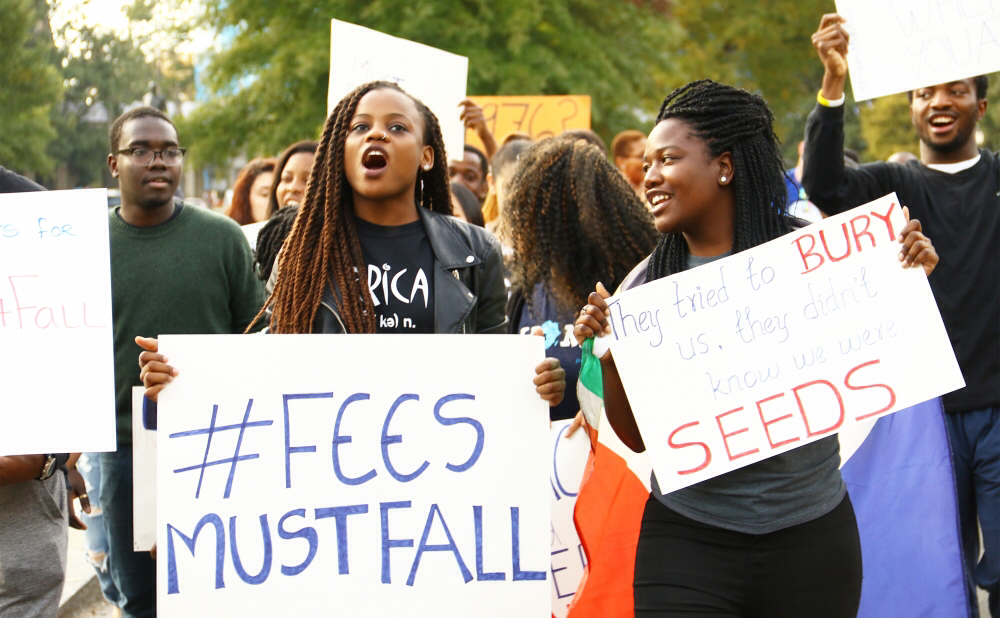
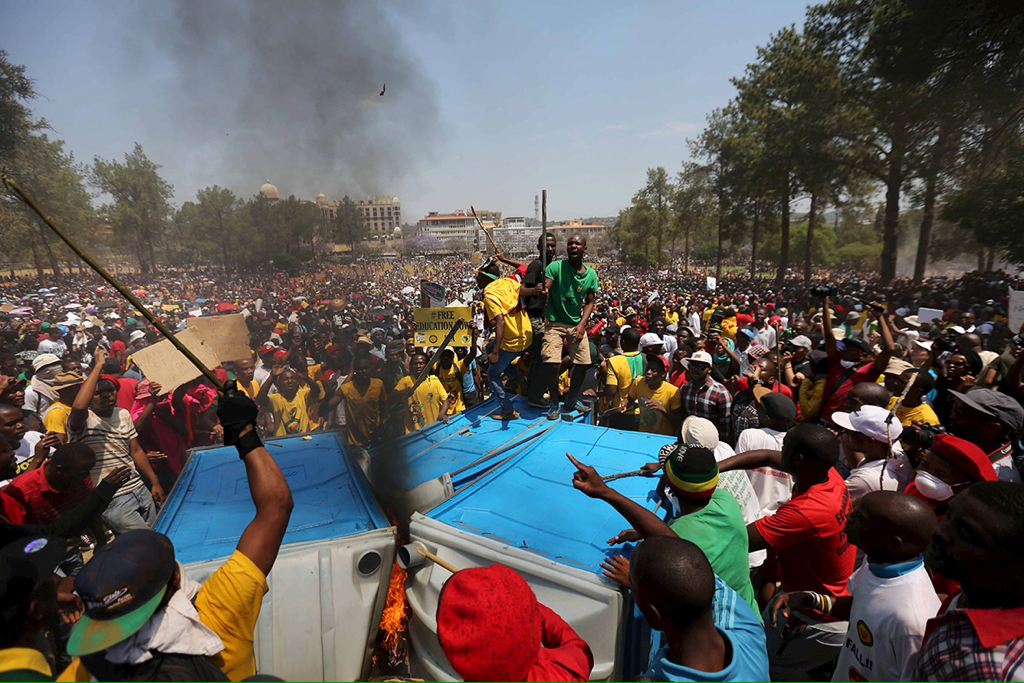



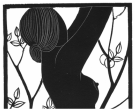
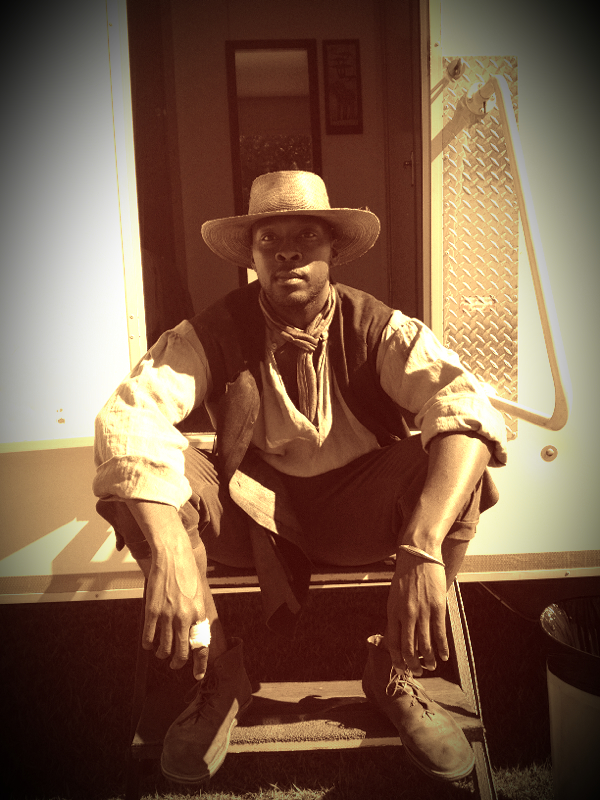
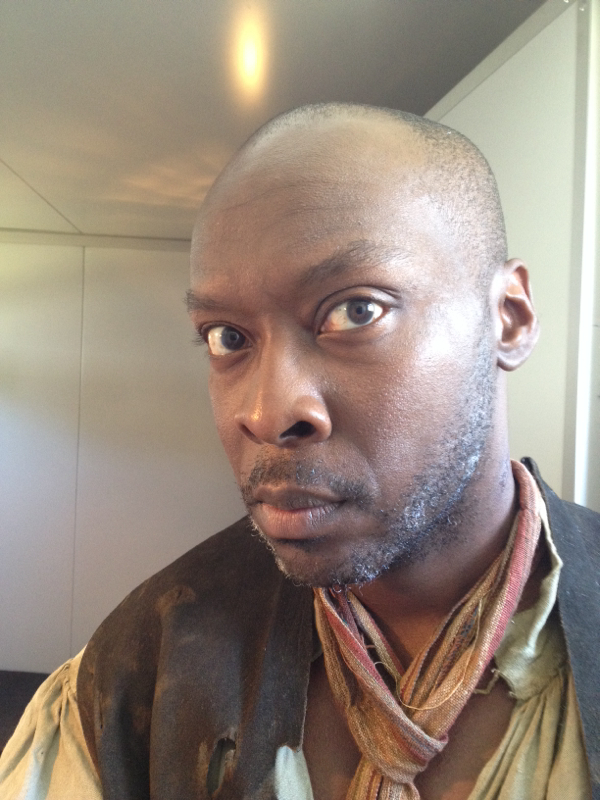
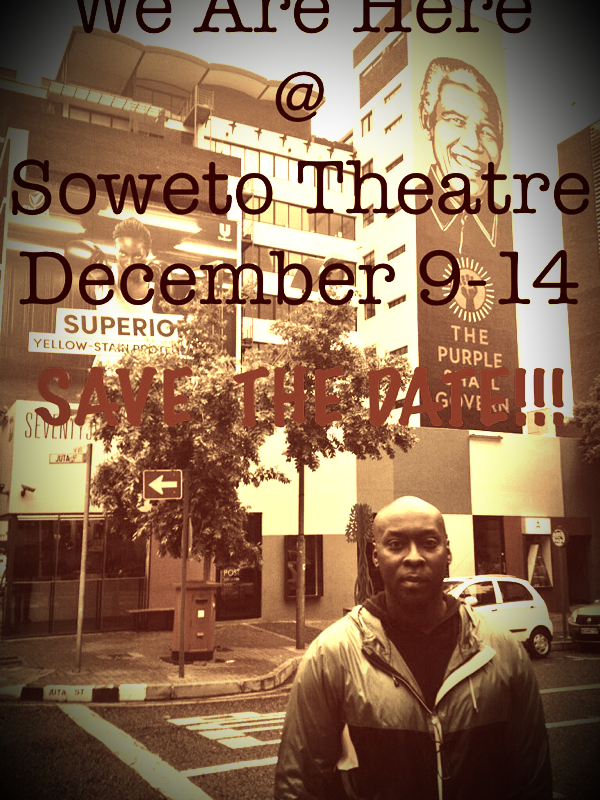
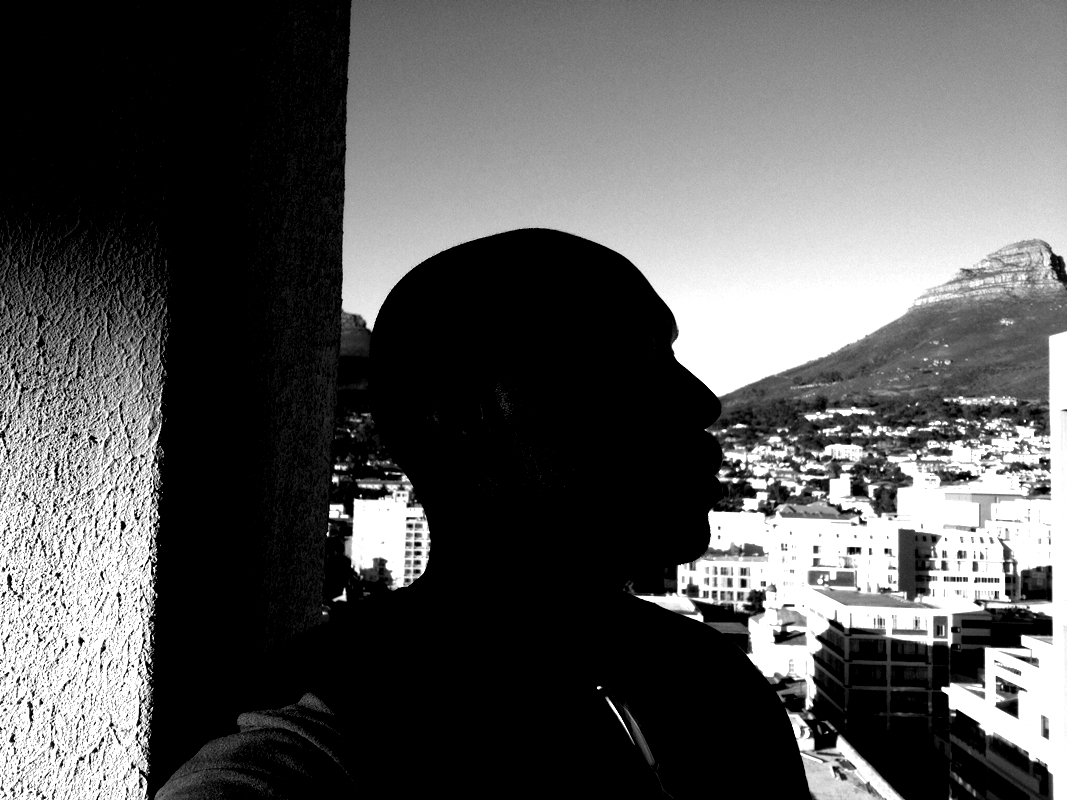
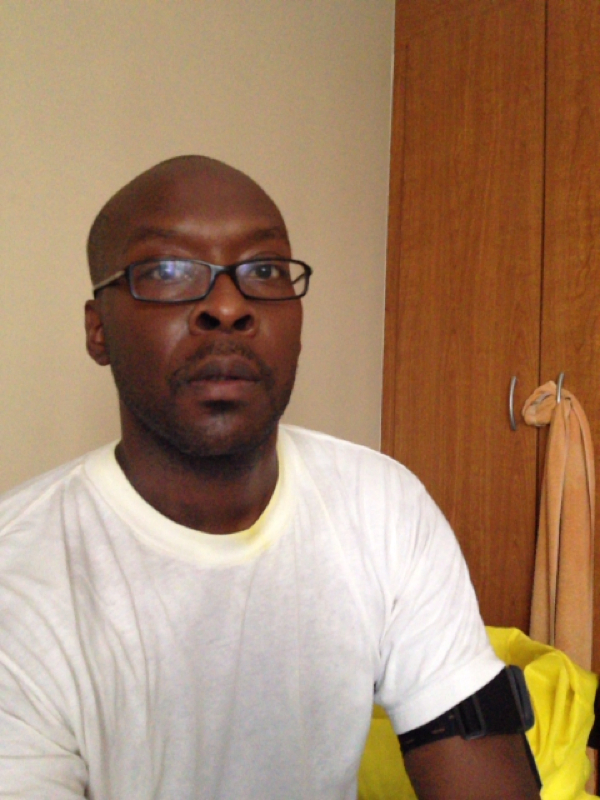
 RSS Feed
RSS Feed
